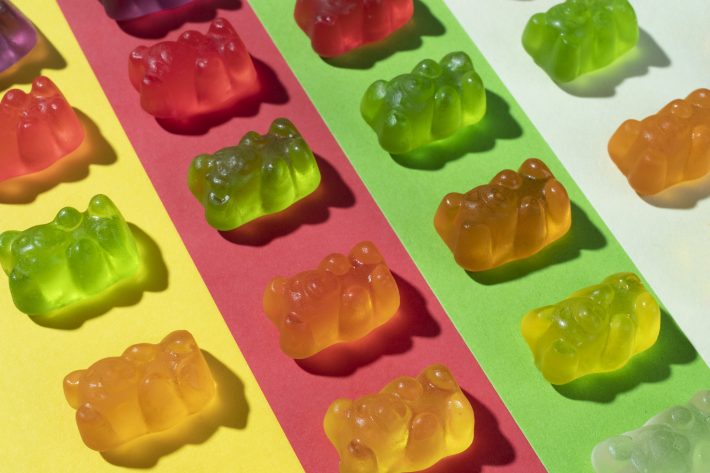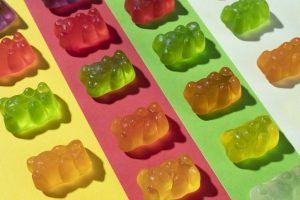Making informed choices about whether to use CBD in the workplace can be difficult – here’s what you need to know
When it comes to the popularity of CBD, no form has proven quite so popular as that of the humble, delicious gummy bear. It’s a form that those familiar with CBD have grown used to seeing in their local shops and at their favorite online retailers. However, there’s been growing concern about CBD and whether it’s going to be accepted by employers. After all, no one wants their boss questioning their work ethic or reliability when their preferred way to unwind is with these tasty treats. Worse yet, what if you get some kind of positive result on a drug test because of it? Today, we’ll break down whether CBD gummy bears show up on a drug test, under what circumstances you might expect a drug test, and what you can do if you’re worried about failing one because of CBD.
Getting Personal: Drug Testing and Your Job
Believe it or not, getting a drug test before being hired is a relatively uncommon experience for most Americans: for the most part, less than 2% of all jobs across major metropolitan areas in the US require pre-employment screening. Still, if you’re part of that average, you might be wondering why companies are so concerned with drug testing in the first place. In fact, there’s quite a few reasons why employees might be subject to a drug test.
- Pre-employment screening: this is often for positions of great responsibility or those in certain industries, such as manufacturing, security, IT, infrastructure, and other critical fields where the ability to perform your job unimpaired is of high importance.
- Randomized testing: Some company perform random drug tests of their existing staff, especially if that staff works in one of the above industries.
- Suspicious behavior: When employers note signs of erratic or poor performance, moodiness and absences, and other behavioral signs typically associated with drug use, it can invite drug testing.
- After accidents: If an employee was injured while on the job through an accident or other event, a drug test may be done to rule out if THC or other chemicals were present in the employee. This is mainly as a means to determine how much liability the company or the employee bears.
- Returning from a rehabilitation or wellness program: This is primarily to ensure that the employee in question is keeping up with their recovery.
As we can see, there’s a lot of reasons someone might be subject to a drug test at work. So, if you’re a fan of CBD gummy bears or use topical lotions infused with hemp oil after a long, you might be wondering – can CBD cause you to fail a drug test?
What exactly is in your favorite CBD Gummies?
There’s two major aspects at play here: is CBD tested for in a drug test, and does your CBD contain THC?
The first one is easy enough to answer – by and large, most drug tests do not explicitly screen for CBD. There are a variety of reasons, with the foremost being that drug tests are more intended for common illicit substances like cocaine, PCP, heroin, and yes – THC. Drug tests can also identify prescription medications like codeine or antidepressants. CBD just isn’t commonly screened for, as it only recently became a widely available compound that is known to be non-hallucinogenic. While it’s worth noting that drug tests will vary, CBD is not often the focus of drug tests – scheduled drugs are.
The other factor – do CBD gummies contain THC – is a trickier one to answer, so let’s break it down.
CBD, Hemp, and Marijuana
CBD, or cannabidiol, comes from hemp. Hemp itself is considered a form of the Cannabis sativa plant. This plant contains many cannabinoids (chemical compounds specific to the plant and its related species), but the best known are CBD and THC, specifically Delta-9-THC. Marijuana and hemp are essentially the same plant but grown to express different properties, and for different purposes. Hemp contains a relatively high concentration of CBD, and a relatively low concentration of THC, with marijuana being the opposite. The legal kind of CBD products, like your favorite gummies, use hemp-derived (not marijuana-derived) CBD.
With this in mind, you’d generally thing that CBD products derived from hemp are free from THC, right? Not quite. There’s quite a few ways people like to extract CBD from Hemp. Below are the three most common forms you’re likely to see.
Most Common Kind of CBD
- CBD Isolate: With Isolate, the hemp plant is processed heavily to remove all traces of the plant matter and other chemicals. The end product is a white, tasteless powder with over a 99% concentration of only CBD. The risk of finding THC in a product that uses CBD isolate is incredibly miniscule.
- Full Spectrum CBD: In this kind of extract, most or all of the many cannabinoids in the hemp plant and other chemical compounds native to it are included. A Full Spectrum CBD product, when legally derived from hemp, is likely to include THC, but not beyond a certain limit. The federal limit is no more than 0.3% on a dry-weight basis.
- Broad Spectrum CBD: Although similar to a Full Spectrum extract, Broad Spectrum usually doesn’t include every cannabinoid of the hemp plant, and often specifically excludes THC. It’s considered a fair middle ground between getting a variety of cannabinoids (like Full Spectrum CBD) and minimizing exposure to THC (like CBD Isolate).
If you enjoy CBD gummy bears and want to avoid THC entirely, then you should consider Isolate or Broad Spectrum CBD. Even if there are only trace amounts, there is a chance it could register on a drug test. It also depends on whether you’re purchasing from a reliable brand, as less scrupulous manufacturers may cut corners. If you can, always review the lab report for the CBD you want to purchase first. Ideally it will be recent, and the batch code on the label will match one you can find on the company’s website. If the company doesn’t have a lab report or the code doesn’t match, then you should probably look elsewhere.
CBD is Here to Stay
In conclusion, it’s pretty clear to see that CBD gummies aren’t going to cause you to fail a drug test just because they have CBD in them. Instead, it’s the trace amounts of THC in full spectrum extracts, and the potential for poorly-manufactured gummies that may cause issues. Make sure to verify before you buy by going to the company’s website and reading their lab reports. Follow these guidelines, and you can enjoy premium hemp-derived CBD gummy bears with peace of mind.


